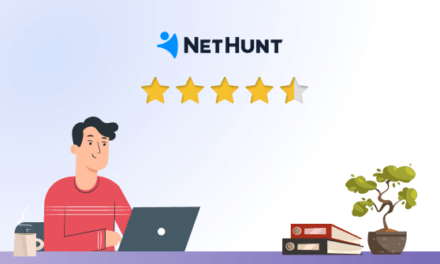In this Zoho CRM review, you will gain valuable insights into the tool’s features and capabilities in 2023 and beyond.
The reviews will cover essential aspects such as the user interface, customization options, integrations, automation capabilities, mobile accessibility, and customer support.
You will learn about Zoho CRM’s strengths, such as its intuitive interface and extensive customization options, allowing you to tailor the tool to your business needs.
Additionally, the review will explore the tool’s integrations with other popular business applications, enabling seamless data flow across platforms.
You will also discover the automation capabilities of Zoho CRM, empowering you to streamline your sales and marketing processes. Lastly, the review will shed light on the quality of Zoho CRM’s customer support, ensuring you have assistance whenever needed.
By the end of this review, visitors will have a comprehensive overview of Zoho CRM’s strengths and limitations, enabling them to evaluate whether it aligns with their unique business requirements, goals, and budget.
Whether you are a small startup, a growing mid-sized company, or an established enterprise, this review will be valuable in your decision-making process.
- What is Zoho CRM?
- Zoho CRM features
- Top Zoho CRM features in detail
- Pros & cons of Zoho CRM
- Zoho CRM pricing & plans
- Customer reviews of Zoho CRM
- Is Zoho CRM right for a small business?
- Is Zoho CRM right for a mid-scale business?
- Is Zoho CRM right for an enterprise?
- The best alternatives of Zoho CRM
- Frequently asked questions
What is Zoho CRM?
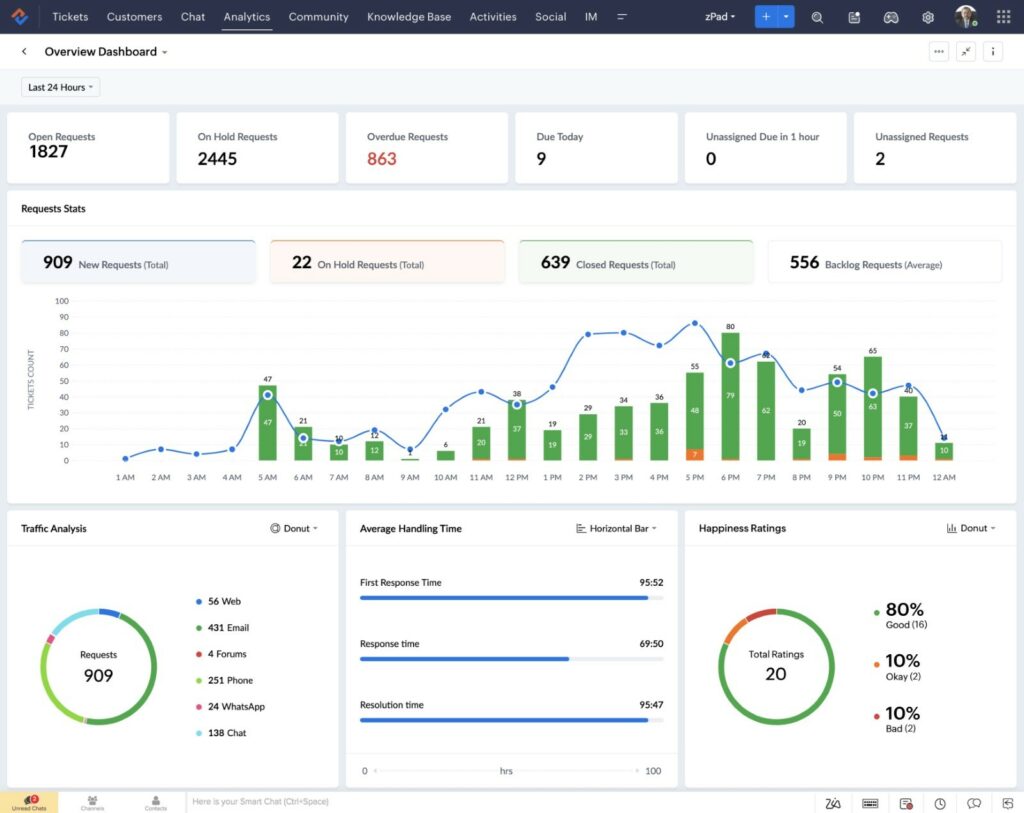
Zoho CRM is a powerful customer relationship management (CRM) software that helps businesses effectively manage their sales, marketing, and customer support activities.
It provides a centralized platform for capturing and organizing customer data, tracking sales opportunities, automating marketing campaigns, and delivering exceptional customer service.
With its user-friendly interface, customization options, and extensive integration capabilities, Zoho CRM enables businesses to streamline their processes, enhance customer engagement, and drive growth.
What is the tool built for?
Zoho CRM is a powerful customer relationship management (CRM) software that helps businesses manage their sales, marketing, and customer support activities effectively.
It offers many features, including contact and lead management, sales pipeline tracking, marketing automation, customer support, analytics, and integration capabilities with other popular business tools.
When did this tool start?
Zoho CRM was initially launched in 2005, making it a well-established platform with years of development and refinement.
How many users use this tool?
Zoho Corporation, the parent company of Zoho CRM, reported having over 90 million users across its suite of products.
However, the specific number of users of Zoho CRM in 2023 or beyond may require up-to-date information from the company.
Who owns the company?
Zoho Corporation, the parent company of Zoho CRM, is privately held and owned by its co-founder and CEO, Sridhar Vembu.
Who are the C-level executives of this company?
The C-level executives of Zoho Corporation, the company behind Zoho CRM, include Sridhar Vembu as the CEO, Vijay Sundaram as the Chief Strategy Officer, Raj Sabhlok as the President, and Hyther Nizam as the President of Engineering and Innovation.
Where is the headquarters of this company?
The headquarters of Zoho Corporation is in Chennai, India, with additional offices and development centers spread across various locations globally, including the United States, Europe, India, China, and Australia.
Zoho CRM features
- Sales Force Automation
- Process Management
- Omnichannel
- Analytics
- Canvas Design Studio
- Journey Orchestration
- Sales Enablement
- Sales Performance Management
- Predictive Sales
- Customization
- Marketing Automation
- Collaboration Tools
- Data Security and Permissions
- Develop APIs for Customization and Integration
- Mobile Apps for iOS and Android
- Integrations with other Zoho products (Zoho Books, Zoho Campaigns, etc.)
- Third-party Integrations (G Suite, Office 365, MailChimp, etc.)
- Customization Options (Layouts, Fields, Modules)
- Customer Support and Service Automation
- Analytics and Reporting
- Workflow Automation
- Territory Management
- Sales Forecasting
- Email Integration and Tracking
- Document Management
- Social CRM
Top Zoho CRM features in detail
Following are the top 10 features of Zoho CRM in detail:
Sales force automation
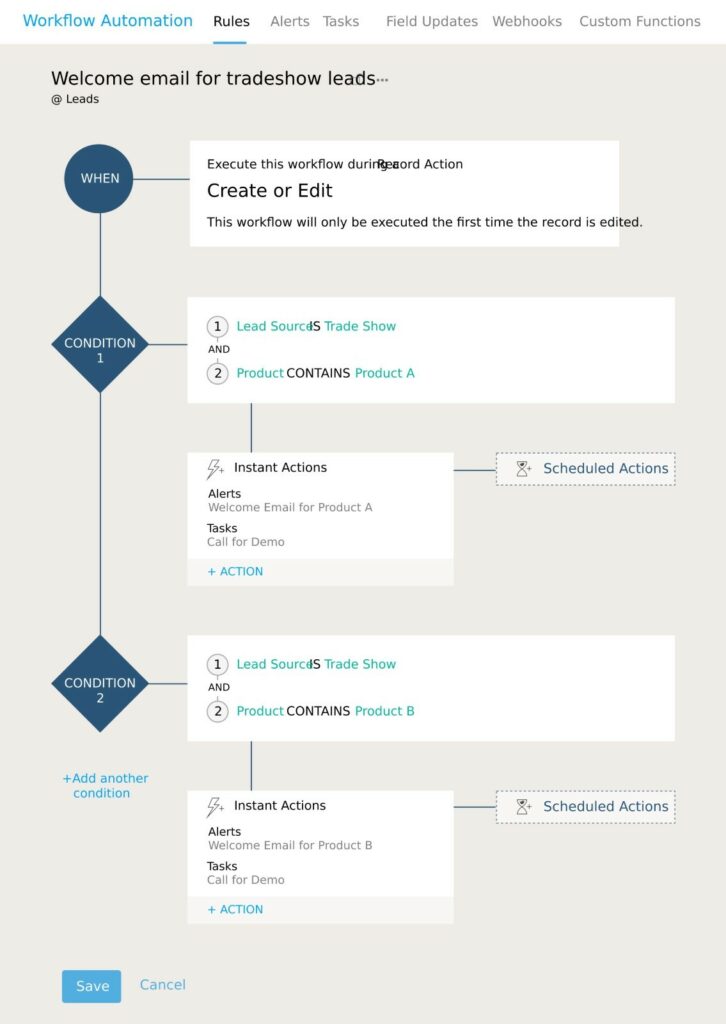
Zoho CRM’s Sales Force Automation feature empowers businesses to streamline their sales processes and maximize productivity. It provides tools for lead management, contact and account management, deal tracking, and pipeline management.
With Zoho CRM, sales teams can efficiently track leads, nurture prospects, and convert opportunities into closed deals. In addition, the system offers automation capabilities, such as workflow rules and email templates, to automate routine tasks and save time.
By providing a unified view of customer data, sales teams can effectively manage their interactions and tailor their sales approach.
Zoho CRM’s Sales Force Automation feature enhances collaboration among team members, improves sales forecasting accuracy, and boosts overall sales performance.
Canvas design studio
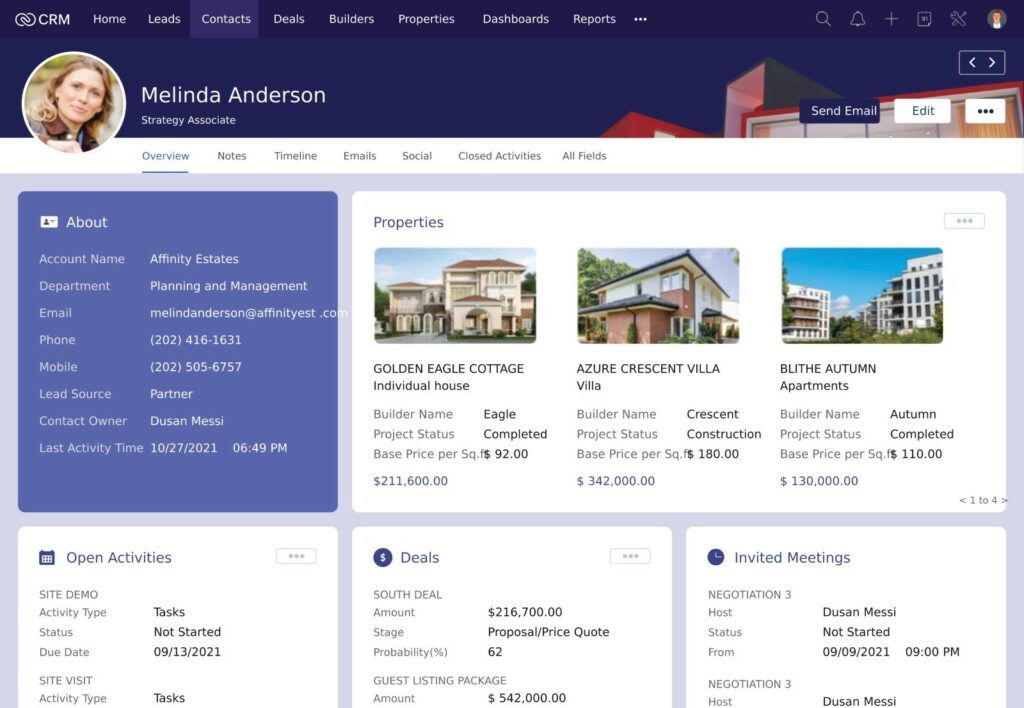
Zoho CRM’s Canvas Design Studio is a powerful tool that puts customization in the hands of users. With its intuitive drag-and-drop interface, users can design visually appealing layouts for their CRM screens.
Whether adding fields, sections, or widgets, Canvas Design Studio allows businesses to create a CRM interface that suits their specific needs.
The flexibility offered by Canvas Design Studio is invaluable. Users can arrange elements on the screen according to their workflow, making navigating and interacting with essential information easier.
By tailoring the CRM interface, businesses can optimize productivity and streamline processes. Each organization has its processes and terminology, and Canvas Design Studio allows for seamless adaptation.
The visual appeal of the customized layouts enhances user experience and engagement. Businesses can make the CRM system more inviting and enjoyable by creating visually appealing screens.
Moreover, Canvas Design Studio enables businesses to adapt and respond to evolving needs. As processes change or new requirements emerge, users can easily modify the layouts to accommodate these changes.
This flexibility ensures the CRM system remains relevant and effective in supporting business operations.
Process management
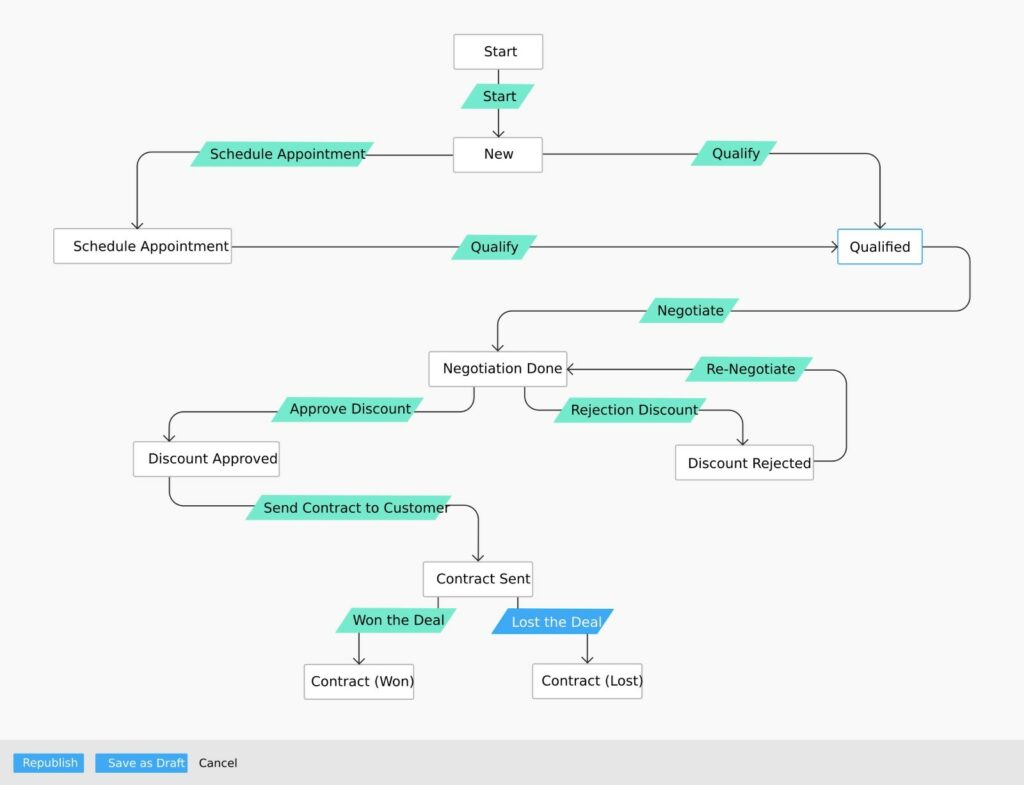
Process Management in Zoho CRM empowers businesses to optimize their sales processes and workflows through automation and customization.
This feature allows users to create tailored process flows, defining specific rules, conditions, and actions at each stage.
By automating repetitive tasks and enforcing standardized processes, Process Management ensures consistent execution of sales activities, reducing manual errors and increasing efficiency.
One of the key benefits of Process Management is the real-time visibility it provides sales managers. They can monitor the progress of deals, identify bottlenecks, and gain insights into team performance.
This visibility enables managers to make data-driven decisions, allocate resources effectively, and take proactive steps to accelerate deal closure.
Process Management contributes to improved productivity and better outcomes by streamlining sales operations. In addition, it ensures that sales teams follow a structured approach, reducing the likelihood of missed opportunities or inefficient practices.
The automation capabilities of Process Management free up valuable time for sales representatives, allowing them to focus on building relationships with prospects and closing deals.
Moreover, it also promotes transparency within the sales organization. With clear process flows and defined stages, everyone involved can easily understand the status of each deal and the following steps to be taken.
This transparency enhances collaboration, facilitates communication, and fosters a cohesive and aligned sales team.
Omnichannel
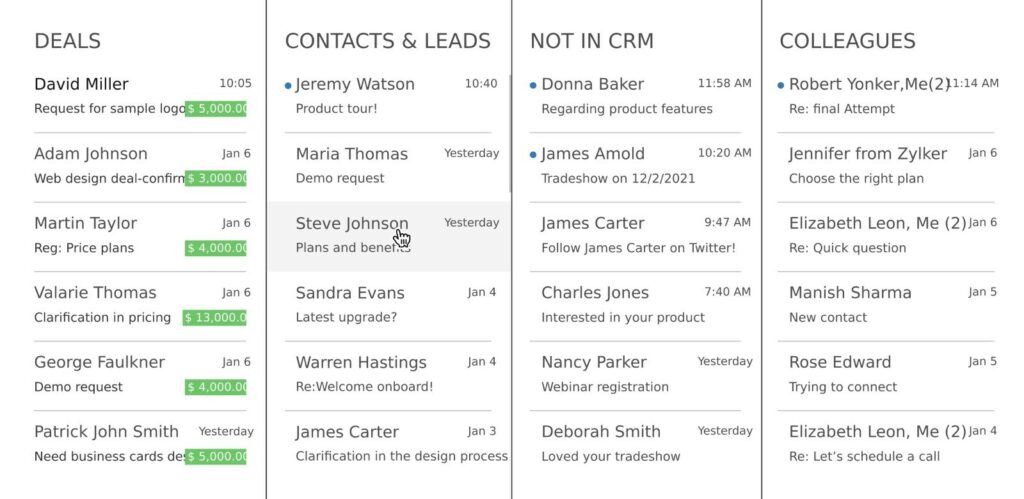
Zoho CRM’s Omnichannel feature is a powerful tool that enables businesses to engage with their customers seamlessly across various communication channels.
By integrating with email, phone, live chat, and social media platforms, Zoho CRM consolidates customer interactions into a centralized system, ensuring a unified and consistent experience.
With Omnichannel, businesses can efficiently respond to inquiries and messages from different channels within a single interface. It eliminates the need for switching between multiple platforms, saving time and effort for customer service teams.
Moreover, the feature allows businesses to maintain a comprehensive conversation history, giving agents a complete view of customer interactions.
One of the key advantages of Zoho CRM’s Omnichannel feature is the ability to provide timely and personalized responses to customer inquiries. Businesses can leverage the consolidated platform to ensure swift and tailored responses, whether a customer reaches out via email, phone, or live chat.
As a result, it enhances customer satisfaction, as customers receive the attention and support they need on time.
Zoho CRM’s Omnichannel feature also helps businesses resolve queries efficiently by streamlining customer communication across channels.
As a result, agents can access relevant customer information and previous interactions, enabling them to address customer issues more effectively.
Furthermore, the Omnichannel feature empowers businesses to build stronger customer relationships. By providing a seamless and consistent experience, customers feel valued and supported throughout their interactions.
Thus, it contributes to increased customer loyalty, retention, and positive word-of-mouth recommendations.
Analytics
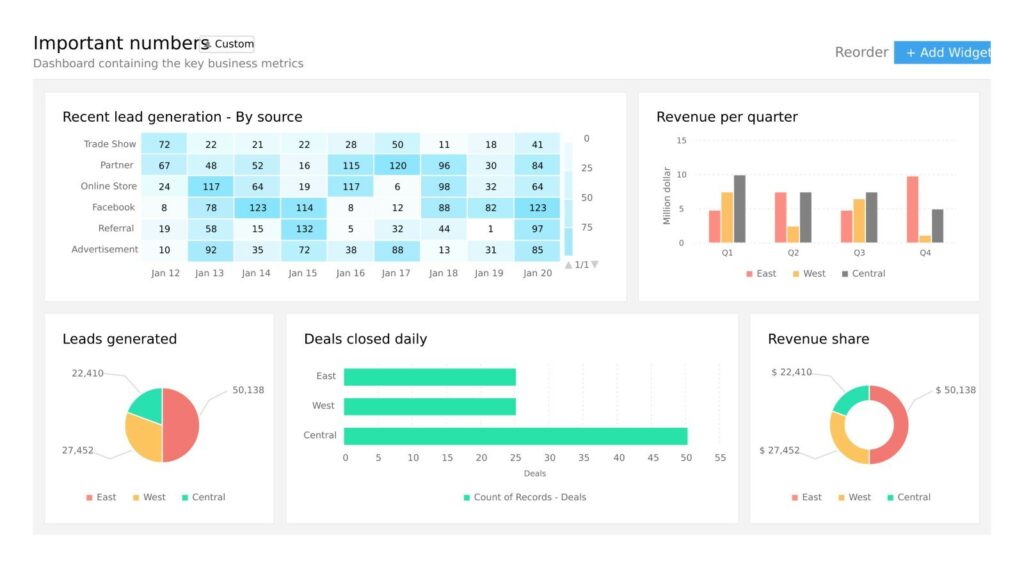
Zoho CRM’s Analytics feature is a powerful tool that goes beyond surface-level data and offers businesses in-depth insights into their sales and customer data.
With a wide range of capabilities, it enables users to understand their performance and make informed decisions comprehensively.
The feature provides pre-built reports, customizable dashboards, and key performance indicators (KPIs), allowing businesses to monitor crucial metrics and track performance effectively.
Using charts, graphs, and tables, users can visually analyze data, spot trends, and identify areas for improvement. In addition, the drill-down analysis feature enables a more granular examination of data, providing deeper insights into specific aspects of sales and customer behavior.
Analytics in Zoho CRM is a valuable tool for measuring sales performance and evaluating the effectiveness of sales strategies.
By monitoring key metrics such as conversion rates, pipeline velocity, and revenue growth, businesses can identify areas of strength and areas that need improvement. This data-driven approach empowers businesses to optimize their sales processes, forecast revenues more accurately, and align their strategies with market trends and customer preferences.
Furthermore, Zoho CRM’s Analytics feature helps businesses identify growth opportunities. By uncovering patterns and correlations within the data, businesses can discover untapped market segments, understand customer buying behaviors, and identify cross-selling or upselling opportunities.
Sales enablement
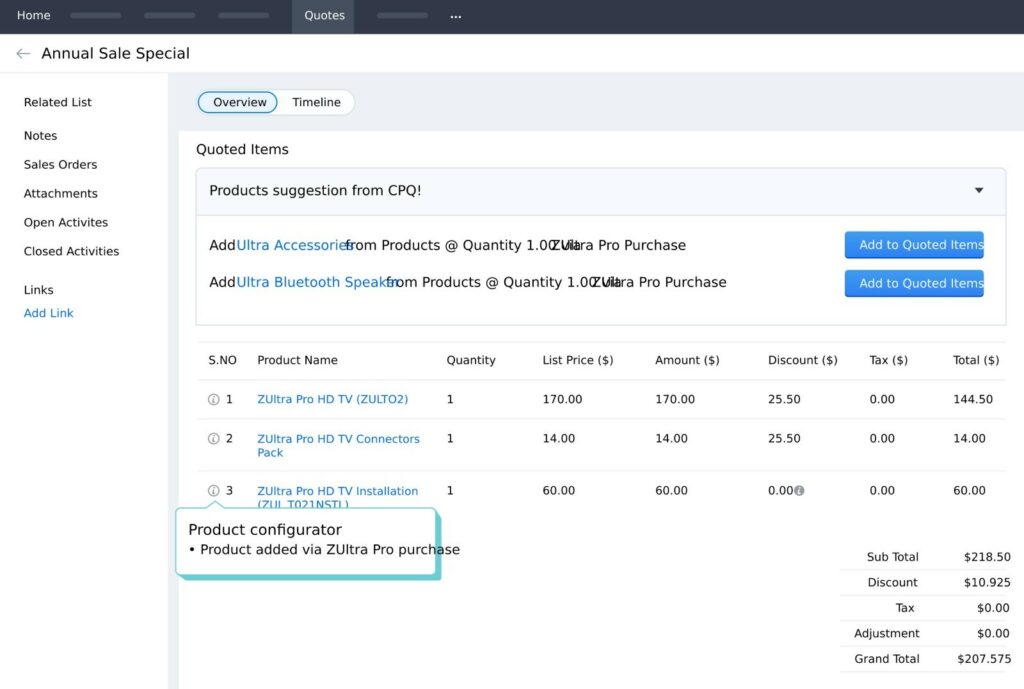
Zoho CRM’s Sales Enablement feature is vital in empowering sales teams to engage with prospects and effectively close deals.
This feature ensures sales representatives can access the necessary tools and resources to excel in their sales efforts by offering document management, content sharing, and collaboration capabilities.
With document management, sales teams can easily organize and access essential sales collateral, presentations, and product information, ensuring they are equipped with up-to-date and consistent content.
Content-sharing functionality enables sales representatives to effortlessly share relevant materials with prospects, providing valuable information and insights to support their buying decisions.
In addition, this feature facilitates seamless collaboration within the sales team, allowing members to work together, share feedback, and refine sales strategies.
It enhances the overall effectiveness of sales pitches by enabling sales teams to deliver impactful and personalized presentations.
With access to the right content at the right time, sales representatives can address customer needs more effectively and tailor their approach to each prospect’s requirements.
Ultimately, it empowers sales teams to make a strong impression on prospects, build trust, and increase their chances of closing deals successfully.
By streamlining content management, facilitating collaboration, and enabling personalized sales pitches, this feature enhances the productivity and effectiveness of sales teams, driving revenue growth and fostering long-term customer relationships.
Performance management
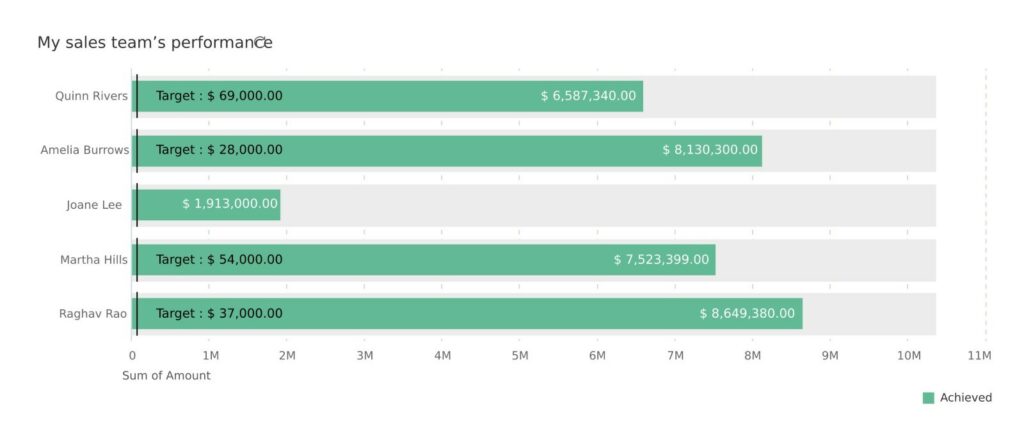
Zoho CRM’s Performance Management feature is a powerful tool that offers businesses valuable insights into the performance of their sales teams.
It enables tracking individual and group performance metrics, allowing managers to monitor key performance indicators and measure progress toward sales targets.
Businesses can align their teams’ efforts with strategic objectives by setting sales targets within the CRM.
In addition, one of the standout aspects of Zoho CRM’s Performance Management feature is its gamification elements.
Incorporating leaderboards and badges fosters healthy competition among sales teams and motivates them to strive for excellence.
These gamification elements boost engagement and drive performance by creating a sense of achievement and recognition.
It also facilitates effective feedback and coaching. Managers can provide personalized feedback, identify areas for improvement, and offer guidance to enhance sales strategies and techniques.
As a result, it helps sales teams refine their skills, overcome challenges, and achieve better results.
Businesses can establish a data-driven sales culture by leveraging Performance Management in Zoho CRM. The feature provides real-time analytics and reports, enabling managers to make informed decisions based on accurate performance data.
It also allows businesses to recognize and reward top performers, fostering a positive work environment and encouraging continued success.
Predictive sales
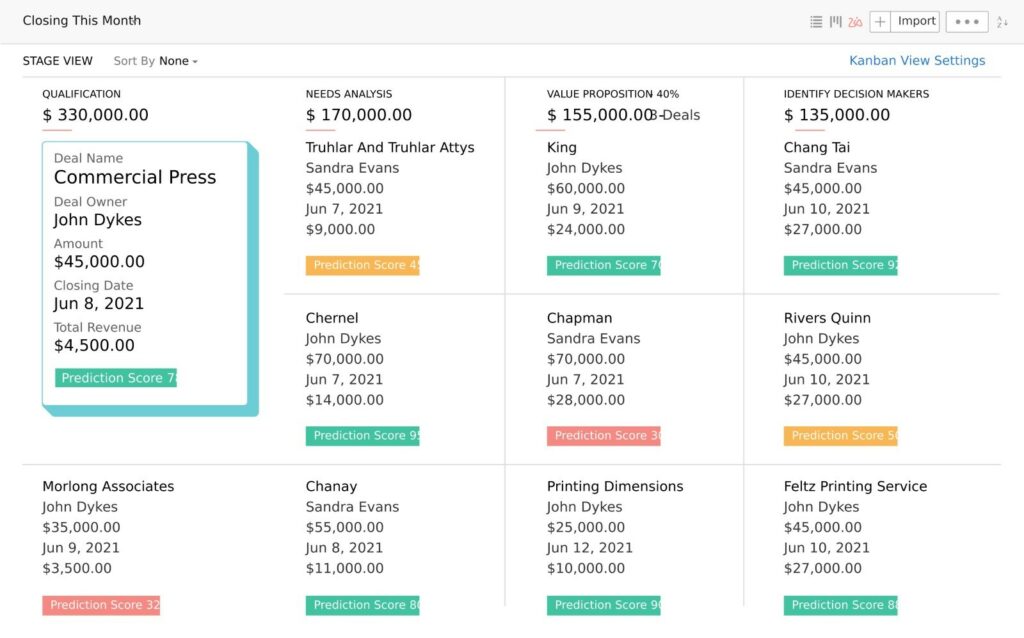
Zoho CRM’s Predictive Sales feature harnesses the power of artificial intelligence and machine learning to empower sales teams with predictive insights.
By analyzing historical data, customer behavior, and sales patterns, Predictive Sales generates valuable predictions related to deal closures, lead conversions, and revenue forecasts.
It enables businesses to gain a competitive edge by focusing their efforts on high-value opportunities and allocating resources effectively.
With the help of this feature, sales teams can make informed decisions backed by data-driven insights. By identifying the most promising prospects and prioritizing their efforts, they can increase their chances of success and drive revenue growth.
It also enables businesses to optimize their sales strategies and allocate resources strategically, resulting in improved efficiency and better outcomes.
By leveraging the predictive capabilities of Zoho CRM, businesses can proactively identify potential roadblocks and take preventive measures to ensure successful deal closures.
They can also gain a deeper understanding of customer behavior and preferences, enabling them to tailor their sales approach and provide personalized experiences that resonate with their target audience.
Customization
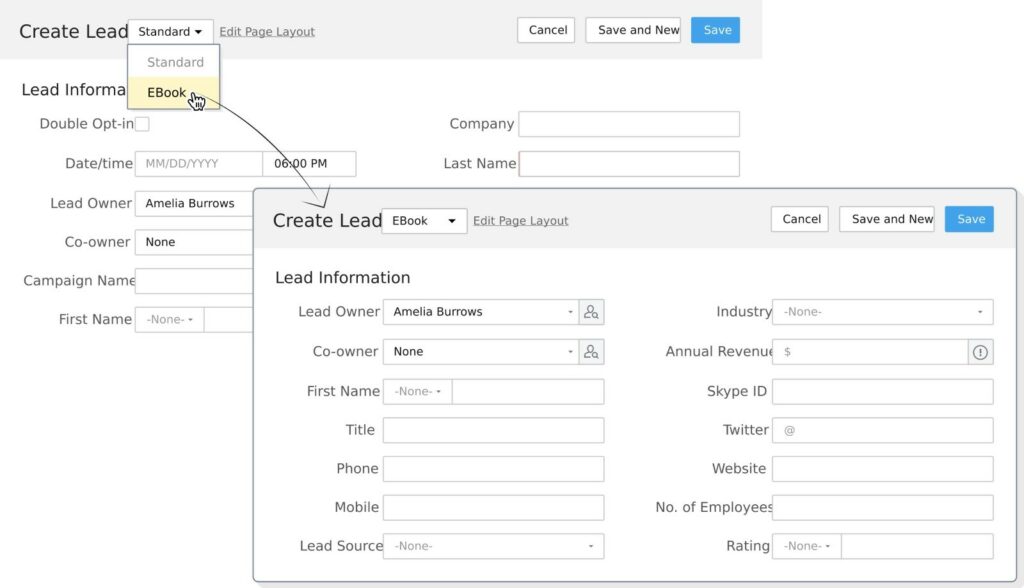
Zoho CRM provides businesses with extensive customization options to tailor the CRM system to their needs. Users have the flexibility to customize various aspects such as fields, layouts, modules, and workflows.
This level of customization allows businesses to align the CRM system with their existing processes and terminologies, ensuring seamless integration with their operations.
By customizing fields, businesses can capture and track the specific data points relevant to their industry or unique requirements.
For example, they can create custom modules to accommodate industry-specific processes or track technical information.
Additionally, users can design layouts that suit their preferences and optimize the data display for more straightforward navigation and efficient data entry.
With the help of workflow customization, businesses can define and automate workflows based on their specific sales processes or business rules. It enables the system to automatically trigger actions, send notifications, and assign tasks, saving time and reducing manual effort.
Furthermore, Zoho CRM’s customization capabilities extend beyond the user interface. Users can integrate third-party applications, create custom functions using Deluge scripting, and leverage APIs to build custom integrations and extensions.
It allows businesses to connect Zoho CRM with their existing software ecosystem and automate data synchronization and workflows across different platforms.
Marketing automation
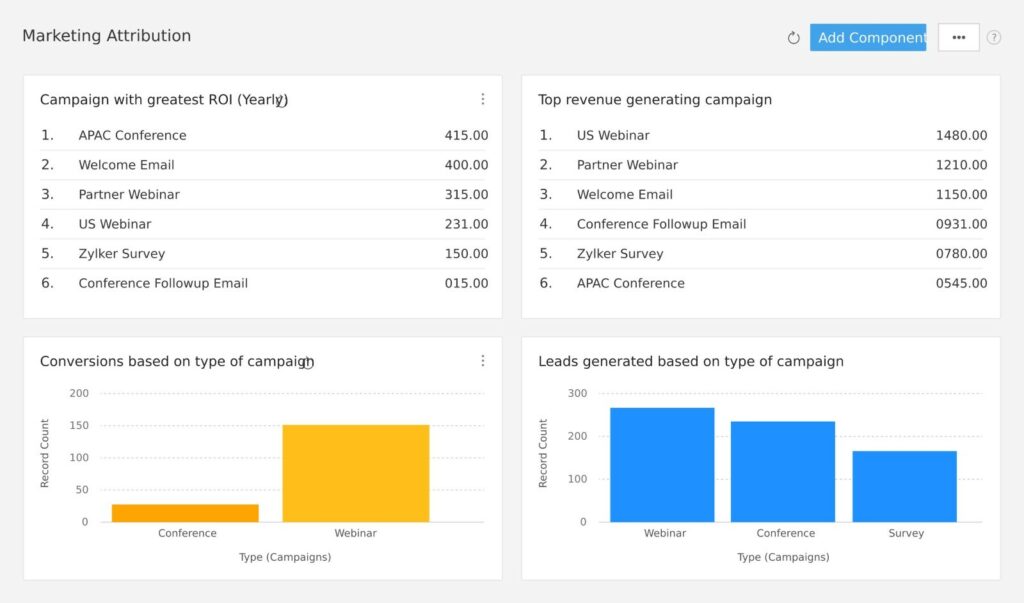
Zoho CRM’s Marketing Automation feature is a powerful tool that empowers businesses to streamline their marketing campaigns and workflows.
With various functionalities such as lead nurturing, email marketing, campaign management, and lead scoring, it provides businesses with the tools to engage with prospects and drive conversions effectively.
One of the key benefits is the ability to create personalized email campaigns. Businesses can segment their audience, create dynamic content, and send targeted emails based on customer preferences and behaviors.
This level of personalization helps businesses deliver relevant content to their audience, increasing the chances of engagement and conversion.
Furthermore, the feature enables users to track campaign performance in real time. Businesses can monitor email open rates, click-through rates, and conversion rates, allowing them to measure the effectiveness of their marketing efforts.
These insights help businesses refine their strategies, optimize campaigns, and allocate resources more effectively.
It also enables businesses to set up triggers and workflows to automatically send follow-up emails or notifications when a prospect takes a specific action, such as visiting a website, clicking on a link, or downloading a resource.
This automation ensures prospects receive timely and relevant communications, nurturing them through the sales funnel.
This feature saves businesses time and improves efficiency by automating repetitive marketing tasks.
For example, manual processes like lead qualification, lead scoring, and campaign scheduling can be automated, allowing marketing teams to focus on strategic initiatives and creative aspects of their campaigns.
Pros & cons of Zoho CRM
Pros of Zoho CRM
- Comprehensive feature set
Zoho CRM offers various sales, marketing, and customer support features. From lead management and sales automation to marketing campaigns and analytics, Zoho CRM provides comprehensive tools to streamline processes and enhance customer engagement.
- Customization options
Zoho CRM allows users to customize it according to their business needs. Users can customize fields, layouts, modules, and workflows, enabling them to tailor the CRM to match their unique processes and terminologies.
This flexibility ensures businesses can adapt the CRM to fit their workflows and preferences.
- Integration capabilities
Zoho CRM integrates seamlessly with other popular business applications, including Zoho’s suite of products and third-party tools.
This integration capability allows for efficient data exchange, eliminates silos, and provides a unified view of customer information across multiple systems. In addition, it enhances productivity by reducing manual data entry and streamlining workflows.
- Scalability and pricing options
Zoho CRM offers different pricing plans that cater to businesses of all sizes, from small startups to large enterprises.
In addition, as a cloud-based solution, it provides scalability, allowing businesses to scale up or down as their needs change quickly.
The pricing options and scalability make Zoho CRM accessible and cost-effective for businesses at various stages of growth.
Cons of Zoho CRM
- Steep learning curve
Zoho CRM’s extensive feature set and customization options can result in a steep learning curve for new users. Users may take time and effort to fully grasp all the functionalities and make the most of the CRM’s capabilities.
As a result, adequate training and support may be required to ensure smooth onboarding and user adoption.
- User interface and navigation
While Zoho CRM has improved its user interface over the years, some users still find the interface slightly cluttered and overwhelming.
The navigation and layout could be more intuitive, especially for users who are not familiar with CRM systems. However, once users become accustomed to the interface, they can efficiently navigate the CRM.
- Limited advanced reporting and analytics
While Zoho CRM provides essential reporting and analytics features, some users may find the advanced reporting capabilities limited compared to other CRM solutions.
Users who require complex data analysis or advanced visualizations may need to explore third-party integrations or additional tools to meet their specific reporting needs.
- Support and documentation
While Zoho CRM offers customer support through various channels, including phone, email, and help center, some users have reported occasional delays in response or difficulty getting timely assistance.
In addition, the documentation and resources provided may also require clarity and comprehensiveness to address user queries effectively.
Zoho CRM pricing & plans
| Features | Standard | Professional | Enterprise | Ultimate |
| Sales force automation | YES | YES | YES | YES |
| Canvas design studio | Additional Pricing | Additional Pricing | Additional Pricing | Additional Pricing |
| Process management | YES | YES | YES | YES |
| Omnichannel | NO | YES | YES | YES |
| Analytics and Reporting | YES | YES | YES | YES |
| Sales enablement | YES | YES | YES | YES |
| Performance management | YES | YES | YES | YES |
| Predictive sales | NO | NO | YES | YES |
| Customization | YES | YES | YES | YES |
| Marketing automation | YES | YES | YES | YES |
Customer reviews of Zoho CRM
- G2: 4/5
- Capterra: 4.3/5
- Software Advice: 4.29/5
Positive review of Zoho CRM
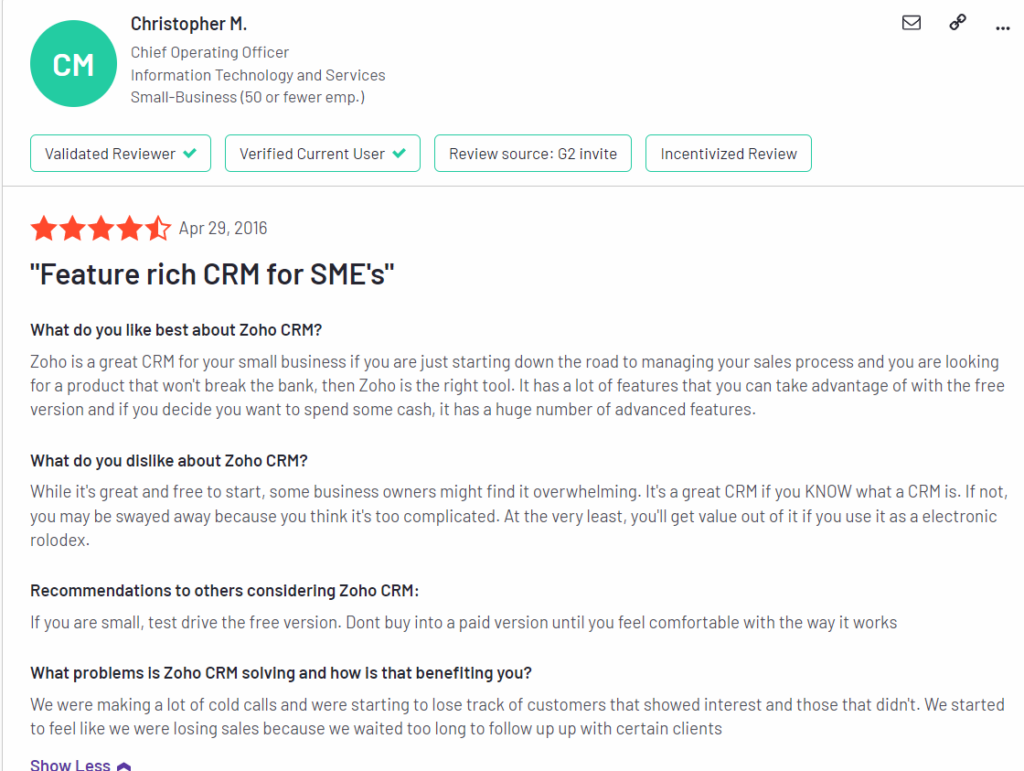
Negative review of Zoho CRM
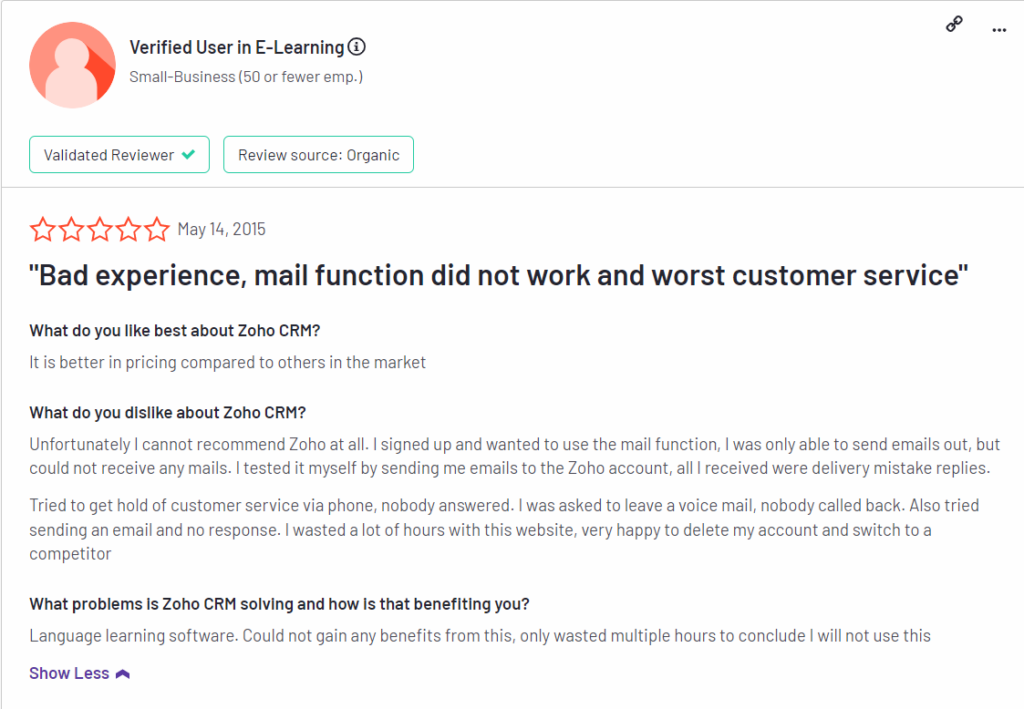
Top 4 things people like about this tool
Easy-to-use interface
One of the key aspects that users appreciate about Zoho CRM is its user-friendly interface. The tool offers a clean and intuitive design, making it easy for users to navigate and perform tasks efficiently.
The well-organized layout and clear labeling of features and options contribute to a smooth user experience, allowing beginners and experienced users to adapt to the system quickly.
Customizable dashboard
Zoho CRM allows users to customize their dashboard according to their specific needs and preferences. Users can personalize their view by rearranging modules, adding or removing widgets, and displaying relevant data.
This flexibility enables users to create a dashboard that suits their workflow and priorities, enhancing productivity and providing quick access to essential information.
Integration with other applications
Zoho CRM offers seamless integration with various third-party applications and tools. This integration capability allows users to connect their CRM with popular business software such as email clients, marketing automation platforms, project management tools, and more.
The integration eliminates manual data entry, ensures data consistency across systems, and enables a streamlined workflow. Users appreciate the ability to sync data and automate processes, saving time and increasing efficiency.
Free version for small business
Zoho CRM offers a free version that benefits small businesses with limited budgets. The free version provides essential CRM functionalities, allowing small businesses to manage contacts, track sales activities, and monitor customer interactions.
This offering allows small businesses to experience the benefits of a CRM system without incurring additional costs. In addition, it serves as a starting point for companies to grow and eventually upgrade to more advanced features as their needs evolve.
Top 4 things people dislike about this tool
The software is full of bugs
Some users have reported experiencing bugs and technical issues while using Zoho CRM. These issues can range from minor glitches to more significant problems that affect functionality and data accuracy.
While Zoho continuously releases updates and bug fixes, some users have expressed frustration with the frequency of these issues and the impact on their daily operations.
Difficult to understand the tool
Zoho CRM can be initially challenging to understand for certain users, especially those new to CRM systems. In addition, the tool offers many features and customization options, which can overwhelm beginners.
Users may require some time and training to grasp the system’s full capabilities and effectively utilize its features. However, improved onboarding resources and documentation could mitigate this challenge.
Old & outdated interface
A common criticism of Zoho CRM is its interface, which some users perceive as outdated in design and aesthetics. While the tool’s functionality remains robust, users desire a more modern and visually appealing interface.
A more visually appealing interface can enhance user engagement and overall user experience.
Poor customer service
Some users have reported challenges with Zoho CRM’s customer service and support. Issues such as delayed response times, difficulty in reaching support representatives, and lack of resolution to problems have been raised.
Prompt and effective customer support is crucial for users who encounter technical difficulties or require assistance using the tool effectively. Improvement in customer service can contribute to a more positive user experience and foster long-term satisfaction.
Is Zoho CRM right for a small business?
Yes, Zoho CRM can be an excellent choice for small businesses. It offers a range of features that are specifically designed to meet the needs of small businesses, helping them effectively manage their sales, marketing, and customer support activities.
Zoho CRM provides small businesses with the ability to centralize customer data, track leads and deals, automate sales processes, and streamline marketing campaigns.
The customization options allow businesses to tailor the CRM to match their unique workflows and terminology. Moreover, the scalability of Zoho CRM ensures that small businesses can start with a plan that suits their current needs and easily upgrade as they grow.
Additionally, Zoho CRM offers competitive pricing plans, including options specifically designed for small businesses. This makes it a cost-effective solution that provides significant value for small businesses looking to improve their customer relationships, boost sales, and drive growth.
Is Zoho CRM right for a mid-scale business?
Yes, Zoho CRM can be a suitable choice for mid-scale businesses. It offers a comprehensive set of features and functionalities that can effectively support mid-scale businesses’ sales, marketing, and customer support needs.
Zoho CRM provides mid-scale businesses with robust contact and lead management, sales force automation, marketing automation, and workflow automation capabilities.
These features enable businesses to efficiently manage customer relationships, track sales opportunities, automate marketing campaigns, and streamline internal processes.
Moreover, Zoho CRM offers customization options that allow mid-scale businesses to tailor the CRM to their specific requirements and workflows.
The integration capabilities of Zoho CRM enable seamless data exchange with other business applications, further enhancing operational efficiency.
Additionally, mid-scale businesses can benefit from Zoho CRM’s scalability, allowing them to accommodate growing demands and expand their CRM usage as their business grows.
Is Zoho CRM right for an enterprise?
Yes, Zoho CRM can be a suitable choice for enterprises. It offers a robust set of features and functionalities that can effectively support large-scale enterprises’ complex sales, marketing, and customer support needs.
Zoho CRM provides enterprise-level contact and lead management, sales force automation, marketing automation, and workflow automation capabilities.
These features enable enterprises to manage vast customer data, automate sales processes, execute targeted marketing campaigns, and streamline complex workflows.
Furthermore, Zoho CRM offers advanced analytics and reporting capabilities, providing enterprises valuable insights into sales performance, customer trends, and revenue forecasts.
This data-driven approach empowers enterprises to make informed decisions and optimize their sales strategies. With customization options and integration capabilities, Zoho CRM can be tailored to meet the specific requirements of enterprise environments.
In addition, it supports seamless data exchange with other business applications, ensuring a unified view of customer information and streamlined operations.
Also, it prioritizes data security and provides robust user access controls, ensuring that enterprise-level data remains secure and compliant with privacy regulations.
Considering Zoho CRM’s scalability, ability to handle large volumes of data, and enterprise-grade features, it can be a reliable CRM solution for enterprises seeking to enhance customer relationships, drive sales, and achieve business success.
The best alternatives of Zoho CRM
Salesmate
Salesmate is a powerful CRM solution focusing on sales automation and pipeline management. It offers contact management, deal tracking, email sequences, built-in calling, power dialer, and many more.
In addition, it provides a user-friendly interface and integrates with various third-party applications.
Salesforce
Salesforce is a market-leading CRM platform that offers a comprehensive set of features and customization options. It caters to businesses of all sizes and provides robust sales, marketing, and customer service functionalities.
HubSpot CRM
HubSpot CRM is a popular choice for businesses looking for a user-friendly and feature-rich CRM solution. It offers contact management, email integration, lead tracking, and marketing automation capabilities. HubSpot CRM also integrates seamlessly with other HubSpot tools.
Pipedrive
Pipedrive is a CRM platform that focuses on sales pipeline management. It offers intuitive lead tracking, deal management, and sales reporting features. In addition, Pipedrive is known for its user-friendly interface and a strong emphasis on visualizing and optimizing the sales process.
Freshsales
Freshsales is a CRM software designed for high-velocity sales teams. It offers lead scoring, email tracking, activity capture, and AI-based lead enrichment features. It also integrates with popular business tools and offers customizable reporting and analytics.
Frequently asked questions
- What is Zoho CRM?
Zoho CRM is a customer relationship management software that helps businesses manage their sales, marketing, and customer support activities effectively.
It offers features such as contact management, lead tracking, sales automation, marketing automation, and analytics to streamline processes and enhance customer engagement.
- Is Zoho CRM suitable for small businesses?
Yes, Zoho CRM is well-suited for small businesses. It provides comprehensive features and customization options tailored to small businesses needs.
In addition, with its affordable pricing plans, scalability, and ability to centralize customer data, Zoho CRM can help small businesses improve their customer relationships and drive growth.
- Does Zoho CRM integrate with other business applications?
Yes, Zoho CRM offers integration capabilities with various business applications. It seamlessly integrates with other Zoho products, such as Zoho Books, Zoho Campaigns, and Zoho Desk, providing a unified platform for managing different aspects of the customer lifecycle.
It also supports integration with third-party tools and offers developer APIs for further customization and integration possibilities.
- Is Zoho CRM cloud-based or on-premises?
Zoho CRM is primarily a cloud-based solution hosted on remote servers and accessed through a web browser or mobile app. However, Zoho also provides an option for on-premises deployment called Zoho CRM On-Premises.
It allows businesses to have more control over their data and infrastructure if they prefer to keep it within their premises.
- What level of support does Zoho CRM offer?
Zoho CRM offers various support channels for its users. Users can access help documentation, video tutorials, and community forums for self-help.
Additionally, Zoho CRM provides email support and phone support during business hours. Depending on the subscription plan, users may also have access to priority support or dedicated account managers for personalized assistance.


